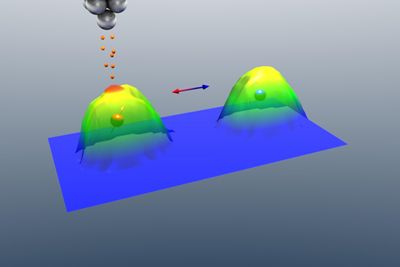Present count of magnetic atoms in one bit of data recorded on a hard disk is nearly 3 million.
 Using a scanning tunneling microscope tip, defined electricity pulses were applied to the molecule, which switches between different magnetic states. (photo: CFN/KIT)
Using a scanning tunneling microscope tip, defined electricity pulses were applied to the molecule, which switches between different magnetic states. (photo: CFN/KIT)
Now, a magnetic memory with a density of one bit per molecule has been developed by scientists from the Karlsruhe Institute of Technology (KIT)’s Center for Functional Nanostructures, the Chiba University, and the Institut de Physique et Chimie des Matériaux.
The SOLEIL synchrotron in France also played a role in the research. The researchers were able to reliably switch a metal-organic molecule between a low-conductive, non-magnetic state and a conductive, magnetic state by using an electric pulse. The study findings have been published in the journal, Nature Communications.
Firs author, Toshio Miyamachi informed that the entry of tiny bit sizes into a hard disk gets prevented by the superparamagnetic effect. This effect means that magnetic memory crystals are more vulnerable to thermal switching with reducing size, thus resulting in information lost. The researchers selected a different approach in which a magnetic iron atom is placed in the center of a 51-atom organic molecule that acts a shell to protect the data saved in the central atom.
Besides having one bit per molecule density, this type of spin crossover molecule-based memory also has the benefit of reliable and purely electric writing process. Head of the research group at KIT’s Physikalisches Institut, Wulf Wulfhe-kel informed that the researchers used a scanning tunneling microscope to apply defined electricity pulses to the nano-scale molecule. This repeatedly alters not only the iron’s magnetic state, but also the molecule’s electrical properties. Thus, the two magnetic configurations cause changeable conductance, which in turn allows the easier detection of the molecule’s magnetic state by simply measuring the resistance.
This study demonstrates the principle viability and benefits of spin crossover molecule-based memories. According to the researchers, the combination of spintronic and memristive properties in a molecule will pave the way to a new research field. Spintronics utilizes individual particles’ magnetic spin to process information and Memristors are memories that save data in the form of variations in resistance.
Source: http://www.kit.edu